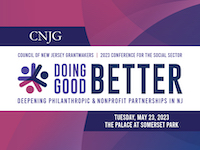Site Search
- resource provided by the Forum Network Knowledgebase.
Search Tip: Search with " " to find exact matches.
Culture Workers often face inconsistent income and undervaluation of their work. Traditional budgeting models leave many without (or lack adequate support of) fair compensation using the belief that mission-motivation and passion for the work replaces...
In 2004, a group of foundations came together to create a funder collaborative in support of Freedom to Marry’s state-by-state strategy to win marriage equality. Over the...

Date: Tuesday, May 23
Time...
Horizon Blue Cross Blue Shield of New Jersey, through its philanthropic arm, The Horizon Foundation for New Jersey, issued $555,000 in grants to 15 non-profit organizations for health, cultural programs and disaster relief throughout New Jersey during...
In September 2022, Mayors for a Guaranteed Income, Center for Guaranteed Income Research, and ...
ASAE & The Center for Association Leadership's landmark study and publication 7 Measures of Success identified the ability to build...
We are pleased to share Strengthening Philanthropy in Newark - Report to the Field 2015 from...
The National Center for Family Philanthropy and Youth Philanthropy Connect, a program of the Frieda C. Fox Foundation, have joined together to bring new resources to the field of philanthropy focused on engaging the next generation of donors and...
On April 24, 2008 a $19 million landmark award was announced that will strengthen Newark public charter schools. The award comprises grants from seven funders including four national family foundations -- the Bill & Melinda Gates Foundation, Doris...
